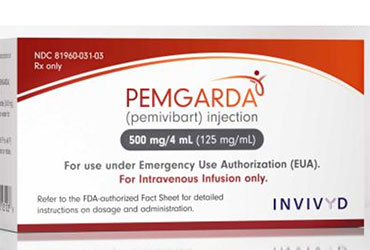Originally published by our sister publication Infectious Disease Special Edition
Pemivibart (Pemgarda, Invivyd), a next-generation COVID-19 monoclonal antibody (mAb), is still showing clinically meaningful in vitro neutralization data against the currently dominant LP.8.1 variant of SARS-CoV-2, according to data provided to the company by the FDA.

Pemivibart has provided continued neutralization activity against KP.3.1.1, XEC and LP.8.1, estimated to be the three most dominant variants currently circulating in the United States, according to the latest CDC COVID Data Tracker update.
The company attributes this neutralizing characteristic to the integrity of the pemivibart epitope. Therefore, Invivyd does not anticipate any meaningful change to pemivibart neutralization activity, aside from expected normal quantitative variation in assay output, for the foreseeable future if the epitope that pemivibart targets remains structurally intact, as it has since Omicron BA.2.
“Pemivibart neutralization activity has been remarkably stable in the face of constant SARS-CoV-2 evolution. Scientifically, the ongoing in vitro neutralization activity as reported for pemivibart is a demonstration of our foundational hypothesis: that virus variants with the structural properties required for fitness and broad infectivity among humans will also likely be susceptible to pemivibart due to our intended accommodation of ACE2 [angiotensin-converting enzyme 2] binding and immune evasion in our molecular design and selection criteria,” said Robert Allen, PhD, Invivyd’s chief scientific officer.
The FDA authorized pemivibart for pre-exposure prophylaxis of SARS-CoV-2 in certain immunocompromised patients.
“Vulnerable patient populations such as cancer patients, those who have had an organ transplant, those with an immunodeficiency and individuals on immunosuppressive therapies are at risk of the short-term and long-term systemic damage COVID-19 continues to pose today,” said Timothy Lee, Invivyd’s chief commercial officer. “Vaccination for these patients, despite serial boosts, has offered modest, short-term and waning protection.
“Further, data presented at ACIP [the Advisory Committee on Immunization Practices] showed that immunocompromised people with COVID-19 are two times more likely to be in the intensive care unit, at three times greater risk to require invasive mechanical ventilation and four times more likely to die in the hospital than the general population.”
Pemivibart is a half-life extended investigational mAb that was engineered from adintrevimab, Invivyd's investigational mAb, which has a robust safety data package and provided evidence of clinical efficacy in global phase 2/3 clinical trials for the prevention and treatment of COVID-19. Pemivibart targets the SARS-CoV-2 spike protein receptor-binding domain, thereby inhibiting virus attachment to the human ACE2 receptor on host cells.
The emergency use authorization (EUA) for pemivibart was granted with data from an immunobridging approach based on the serum virus neutralizing titer–efficacy relationships identified with other neutralizing human mAbs against SARS-CoV-2. This includes adintrevimab, the parent mAb of pemivibart, and other mAbs that were previously authorized for the EUA. There are limitations of the data supporting its benefits. Evidence of clinical efficacy for other neutralizing human mAbs against SARS-CoV-2 was based on different populations and SARS-CoV-2 variants that are no longer circulating. Further, the variability associated with cell-based EC50 value determinations, along with limitations related to pharmacokinetic data and efficacy estimates for the mAbs in prior clinical trials, affect the ability to precisely estimate protective titer ranges. Certain SARS-CoV-2 viral variants also may emerge that have substantially reduced susceptibility to pemivibart.
Pemivibart injection (4,500 mg) for IV use has an EUA for the pre-exposure prophylaxis of COVID-19 in adults and adolescents (≥12 years of age weighing ≥40 kg) who have moderate to severe immune compromise due to certain medical conditions or receipt of certain immunosuppressive medications/treatments and are unlikely to mount an adequate immune response to COVID-19 vaccination.
In addition, the company is working on VYD2311, a novel mAb candidate being developed for COVID-19. The pharmacokinetic profile and antiviral potency of VYD2311 may offer the ability to deliver clinically meaningful titer levels through more patient-friendly means, such as an intramuscular route of administration.
VYD2311 was engineered using Invivyd’s proprietary integrated technology platform and is the product of serial molecular evolution designed to generate an antibody optimized for neutralizing contemporary virus lineages. VYD2311 leverages the same antibody backbone as pemivibart.
—From company press materials.

